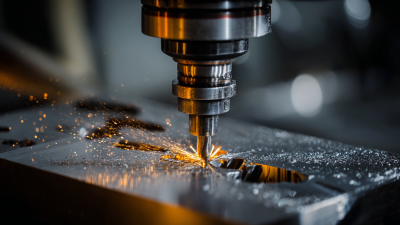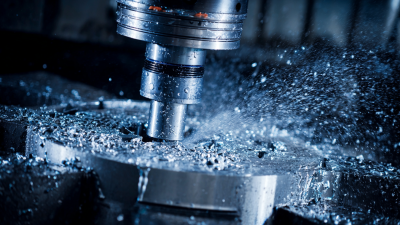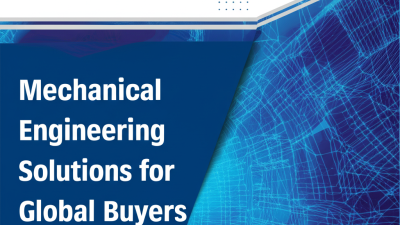How to Choose the Right CNC Precision Engineering Solutions for Your Business Needs
In today's rapidly evolving manufacturing landscape, the demand for high-quality, efficient production methods underscores the importance of selecting the right CNC precision engineering solutions. According to a report by MarketsandMarkets, the global CNC machining market is projected to reach $100 billion by 2025, growing at a CAGR of 6.7%. This growth reflects the increasing reliance on advanced manufacturing technologies to meet stringent precision and quality standards across various industries.

As businesses face challenges such as reducing lead times and improving product consistency, understanding the alternatives in CNC precision engineering becomes critical. Whether you are a small enterprise or a large manufacturer, making informed decisions about CNC solutions not only influences operational efficiency but also impacts overall competitiveness in the market.
Understanding CNC Precision Engineering and Its Benefits for Your Business
CNC precision engineering is a transformative approach that leverages computer-controlled machinery to produce intricate and accurate components for various industries. This technology not only enhances productivity but also ensures a high level of precision that is often unattainable with traditional manufacturing methods. By utilizing CNC machines, businesses can achieve tighter tolerances, leading to improved product quality and reduced waste. This is particularly crucial in sectors such as aerospace, automotive, and medical devices, where precision is paramount.
One of the key benefits of CNC precision engineering is the significant reduction in lead times. Automated processes allow for quick adjustments and modifications, enabling companies to respond swiftly to market demands or design changes. Additionally, the consistency and repeatability of CNC machining mean that businesses can produce large volumes of parts without compromising on quality. Ultimately, investing in CNC precision engineering solutions can provide companies with a competitive edge, streamlining operations and fostering innovation in product development.
Key Considerations When Selecting CNC Precision Engineering Solutions
When selecting CNC precision engineering solutions for your business, several key considerations come into play. First and foremost, the growing demand for high-precision, multi-axis machining centers cannot be overlooked. As highlighted by recent market trends, the CNC machine tools market is projected to grow significantly, driven in part by advancements in AI technology. This evolution is crucial for businesses that require accurate and efficient production processes. Understanding the specific demands of your industry and aligning them with the capabilities of CNC solutions is essential.
Another important consideration is the financial aspect of such investments. The recent introduction of financial services expertise within manufacturing trade associations signifies the increasing importance of strategic financial planning when choosing CNC solutions. Ensuring that you have access to the right financial resources and support can influence your decision on which CNC systems to invest in, especially as companies like Norck expand their precision CNC machining capabilities. By factoring in these considerations, businesses can effectively choose CNC precision engineering solutions that meet their unique operational needs and budget constraints.
How to Choose the Right CNC Precision Engineering Solutions for Your Business Needs
| Criteria | Importance Level (1-5) | Description |
|---|---|---|
| Machine Precision | 5 | The accuracy of the CNC machine affects the quality of the finished product. |
| Material Compatibility | 4 | Ensure the CNC solutions can work with the materials you use. |
| Software Integration | 4 | CNC solutions should integrate with your existing software systems. |
| Cost Efficiency | 3 | Evaluate if the investment will yield a good return over time. |
| Technical Support | 5 | Strong customer support ensures quick resolution to issues. |
| Scalability | 4 | Ability to expand operations as business grows. |
| Lead Time | 3 | Consider the time required to deliver and set up solutions. |
Evaluating the Quality and Accuracy of CNC Machining Services
When evaluating the quality and accuracy of CNC machining services, it’s crucial to focus on the tolerances and precision specifications that align with industry standards. According to a report from the Precision Machined Products Association (PMPA), over 80% of manufacturers prioritize precision within ±0.0005 inches for critical components. This level of accuracy is essential in sectors such as aerospace and medical device manufacturing, where even the slightest deviations can lead to significant safety concerns and financial losses.

Additionally, it’s important to assess the technological capabilities of CNC machining providers. A study by the National Institute of Standards and Technology (NIST) revealed that advanced CNC machines with multi-axis capabilities can improve production accuracy by up to 30%. These machines are equipped to handle complex geometries that are increasingly demanded in modern engineering solutions. When choosing a CNC machining service, businesses should also consider certifications, such as ISO 9001, which ensures a commitment to quality management systems and continual improvement in machining processes. By thoroughly evaluating these factors, companies can make informed decisions that directly impact their operational efficiency and product reliability.
The Role of Technology in Enhancing CNC Precision Engineering
The integration of advanced technology plays a pivotal role in enhancing CNC precision engineering, revolutionizing the manufacturing landscape. With the global precision turned product manufacturing market projected to grow significantly, reaching USD 196.11 billion by 2034, it is evident that businesses must leverage these technological advancements to stay competitive. Innovations such as artificial intelligence and augmented reality are not only streamlining processes but also improving the quality and safety standards in industries like aerospace and medical technology.
Augmented reality, for instance, is transforming engineering education by merging virtual and real-world environments, allowing for more interactive and practical learning experiences. This technology enhances understanding and application, which is essential for developing skilled professionals in precision engineering. Additionally, the rise of ultra-precision machining technologies indicates a future where precision becomes even more integral to manufacturing processes, making it essential for businesses to adapt and invest in these emerging solutions to meet their operational needs effectively.
Evaluation of CNC Precision Engineering Technologies
This chart represents an evaluation of various aspects of CNC precision engineering technologies relevant to business needs. Each aspect is scored on a scale from 1 to 10, demonstrating the importance of factors like machining speed, accuracy, material versatility, cost efficiency, and ease of use in choosing the right solution.
Cost-Effectiveness vs. Quality: Finding the Right Balance in CNC Solutions
When selecting CNC precision engineering solutions for your business, one of the most critical factors to consider is the balance between cost-effectiveness and quality. Industry reports indicate that companies can spend anywhere from $15,000 to over $300,000 annually on CNC machinery, depending on their production needs and desired capabilities. This wide range highlights the importance of making informed decisions that align with your budget while ensuring the quality required for high-precision projects.

A recent survey showed that 70% of manufacturers prioritize high-quality output over lower costs, underlining the industry's commitment to precision. However, striking a balance is essential; investing in superior technology can lead to long-term savings through reduced waste and increased efficiency. Furthermore, adopting automated CNC solutions often leads to a 40% reduction in labor costs, significantly impacting overall profitability. Therefore, businesses must evaluate their specific operational needs against these cost considerations to ensure they choose the right CNC solutions that promise both reliability and financial viability.
Related Posts
-

Ultimate Checklist for Achieving Best CNC Precision Engineering Excellence
-

CNC Precision Engineering Versus Traditional Machining A Comprehensive Comparison
-

Top Trends in Best Machine Engineering: What to Expect in 2025
-

Unveiling Secrets to Source Premium Suppliers in Best Machine Engineering
-

Addressing the Key Challenges in the Performance of Civil Engineering Machines: A Data-Driven Approach
-

Ultimate Guide to Selecting the Best Motor Mechanical Engineering Solutions for Global Buyers
